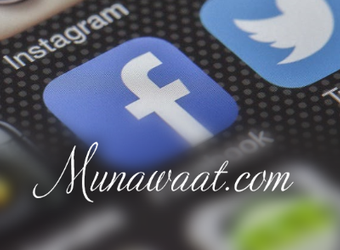Social Media
Social media platforms like Instagram, TikTok, and Snapchat have become some of the most popular ways to stay connected with friends and followers online.
With billions of active users, these platforms offer a unique way to share your life with others and build a following.
While social media can be a great way to connect with others, it's important to remember that not everything you see is real.
People can edit and filter their photos and videos to make them look perfect, which can give you an unrealistic view of what someone's life is actually like.
It's also important to be aware of the potential cyberbullying and negativity that can come from social media.
If you're ever feeling overwhelmed or harassed by someone online, be sure to report it to the platform and block the user.
If used responsibly, social media can be a fun and informative way to connect with others. Just remember to be aware of the potential dangers that come with it.
Instagram is a social networking service owned by Facebook, Inc. It was created by Kevin Systrom and Mike Krieger and launched in October 2010 on iOS.
A version for Android devices was released a year and a half later, followed by a feature-limited website interface in November 2012, a Fire OS app on June 15, 2014, and an app for Windows 10 tablets and computers in October 2016.
The app allows users to upload photos and videos, which can be edited with filters and organized with tags and location information.
Users can also browse other users' content by tags and locations, and view trending content. Users can "like" photos, follow other users to add their content to a feed and comment on photos.
The service was originally distinguished by only allowing content to be framed in a square (1:1) aspect ratio, but these restrictions were eased in 2015.
The site also added messaging features, the ability to include multiple images or videos in a single post, as well as "Stories" similar to its main competitor Snapchatnwhich allows users to post photos and videos that disappear after 24 hours.
Tik Tok
TikTok, known in China as Douyin (Chinese: 抖音; pinyin: Dǒuyīn), is a video-sharing social networking service owned by the Chinese company ByteDance.
The social media platform is used to make a variety of short-form videos, from genres like dance, comedy, and education that have a duration from fifteen seconds to one minute (three minutes for some users).
TikTok is an international version of Douyin, which was originally released in the Chinese market in September 2016.
Since its launch in 2016, TikTok/Douyin rapidly gained popularity in East Asia, South Asia, Southeast Asia, the United States, Turkey, Russia, and other parts of the world.
Facebook is an American online social media and social networking service based in Menlo Park, California, and a flagship service of the namesake company Facebook, Inc.
It was founded by Mark Zuckerberg with his college roommates and fellow Harvard University students Eduardo Saverin, Andrew McCollum, Dustin Moskovitz, and Chris Hughes.
The founders initially limited the website's membership to Harvard students and subsequently Columbia, Stanford, and Yale students.
Membership was eventually expanded to the remaining Ivy League schools, MIT, and higher education institutions in the Boston area.
Facebook added support for students at various other universities before it opened to high school students, and eventually to anyone over the age of 13.
The website's membership function was removed in 2015 leaving only a "like" button on business pages. Zuckerberg announced that over time he wants to add more options for what users can do on their profiles when they "like" a page or product, saying he plans on adding options for music, movies, reading, and other activities.
Snapchat
Snapchat is a multimedia messaging app used globally, created by Evan Spiegel, Bobby Murphy, and Reggie Brown when they were students at Stanford University.
The app was originally released as "Picaboo" in July 2011 and later renamed Snapchat. It became one of the first social networks to develop a foothold with the teen and young adult demographic when it launched its flagship product in 2011.
Snapchat allows users to send photos, videos, text, and drawings. The app also supports voice and video calling.
The unique feature of this app is that all messages disappear after a short time and cannot be screenshotted or saved within the app.
This makes it ideal for sharing candid or potentially embarrassing photos without the risk of them being widely circulated.
YouTube
YouTube is a video-sharing website and application owned by Google. It allows users to upload, view, and share videos.
YouTube was founded in February 2005 by three former PayPal employees: Chad Hurley, Steve Chen, and Jawed Karim.
The name "YouTube" was chosen as a play on the word "you."The site quickly became popular after its launch, with 65,000 new videos being uploaded every day.
YouTube has since become one of the most popular websites on the internet and has been ranked as the second-largest search engine after Google. As of 2019, it has over 2 billion active users monthly.
WhatsApp Messenger is a cross-platform instant messaging service owned by Facebook, Inc. It allows users to send text messages and voice messages, make voice and video calls, and shares images, documents, user locations, and other media.
WhatsApp's client application runs on mobile devices but is also accessible from desktop computers; the service requires consumer users to provide a standard cellular mobile number for registering with the service.
Originally developed in 2009 as a simple way to communicate via text message without incurring SMS fees, WhatsApp has since added multimedia features such as photos, videos, and file sharing.
Risks associated with social media use
Most people use social media every day. It's a great way to stay connected with friends and family, share news and experiences, and even make new friends.
However, there are some risks associated with social media use. These include cyberbullying, identity theft, and privacy breaches. It's important to be aware of these risks and take steps to protect yourself online.
Here are some tips for using social media safely:
- Don't share personal information like your home address or phone number.
- Be careful about what you post online. Once something is posted, it can be very difficult to remove it.
- Think before you click. Don't click on links from people you don't know, and be careful about downloading files from unknown sources.
- Keep your privacy settings up to date. Check the privacy settings for each social media platform you use regularly, and make sure only people you know and trust can see your information.
- Be aware of what you're sharing. Remember that anything you post online, including photos and videos, can be seen by anyone with an internet connection.
- Be kind to others online. Just as in the real world, it's important to be respectful of others when you're using social media. If you wouldn't say it in person, don't say it online.
By following these tips, you can help keep yourself safe when using social media.
Pros and cons of using social media
Social media has become an integral part of our lives. We use it to connect with friends and family, share news and experiences, and stay up-to-date on current events.
But there are also potential risks associated with social media use. These risks can include cyberbullying, online predators, and identity theft.
When used responsibly, social media can be a great way to stay connected with the people and world around you. But it’s important to be aware of the potential risks before you start using any social media platform.
Cyberbullying is one of the most common risks associated with social media use. Cyberbullies can use platforms like Facebook, Twitter, and Instagram to anonymously harass and intimidate their victims.
They may also post hurtful comments or rumors about their victim in order to embarrass or humiliate them.
Another risk of social media use is online predators. Predators can use social media to connect with potential victims and build trusting relationships.
They may then try to meet their victim in person, which can lead to dangerous or even deadly consequences.
Identity theft is another possible risk of social media use. Hackers can access your personal information like your name, address, and Social Security number through your social media accounts.
They may then use this information to open new accounts in your name, make unauthorized charges on your existing accounts, or even commit tax fraud.
To help protect yourself from these risks, it’s important to use social media responsibly. That means being aware of the potential risks and taking steps to protect yourself from them.
For example, you can limit the amount of personal information you share on social media, and you can set your privacy settings so that only people you know and trust can see your posts.
You should also be careful about who you friend or follow on social media. If you don’t know someone in real life, there’s no need to connect with them online. And if you ever feel like you’re being harassed or bullied on social media, don’t hesitate to report it to the platform’s administrators.
By taking these precautions, you can help keep yourself safe from the potential risks of social media use.






Related Articles